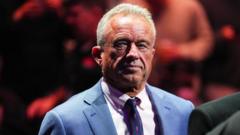Robert F. Kennedy Jr. aims to eliminate ultra-processed foods and advocate for healthier dietary practices, but challenges from the food industry and past controversies complicate his mission.
**Can RFK Jr Shape a Healthier Future for American Diets?**

**Can RFK Jr Shape a Healthier Future for American Diets?**
Kennedy's ambitious plan to reform the food landscape faces both support and skepticism.
Kennedy, who has been nominated to lead the Department of Health and Human Services under President-elect Donald Trump, is focusing on transforming how Americans eat and drink. By targeting the ingredients in iconic products, such as food dyes in cereals and unhealthy additives in fast food, he claims to protect the health of vulnerable populations, particularly children. “We are betraying our children by letting [food] industries poison them,” he stated at a rally after transitioning from his independent presidential bid to support Trump.
Despite his controversial history—which includes various unsubstantiated health claims—Kennedy does have some backing from health experts and officials who are eager for change within the FDA and public health policies. Colorado's Democratic Governor Jared Polis publicly endorsed him but cautioned that science should underpin health decisions. Kennedy's campaign slogan, “Make America Healthy Again,” encapsulates his commitment to combatting chronic diseases linked to unhealthy eating.
Among his proposed reforms, Kennedy emphasizes the need for stricter regulations on ultra-processed foods, which include sugary snacks and other items loaded with additives. He expresses particular concern for the quality of school lunches, asserting that children are currently exposed to a “toxic soup.” As the potential head of the FDA—which oversees food safety and regulation—Kennedy is poised to engage in a critical discourse around nutrition standards.
However, the task ahead is daunting. Many experts, including former officials, warn that delivering on these promises may be impractical due to significant political and bureaucratic barriers. The FDA does not alone regulate the food industry; both the USDA and Congress are involved in shaping policy. There are also concerns regarding the feasibility of Kennedy’s ideas and the potential pushback from the powerful food industry, which may resist substantial changes to production and regulatory standards.
In addition to advocating for the elimination of food dyes, Kennedy has proposed more controversial ideas like banning fluoride in drinking water and promoting the benefits of raw milk. Experts have cautioned against these proposals, citing the risks associated with unpasteurized products and the established benefits of fluoride for dental health.
Public health experts who align with Kennedy’s perspective hope that he can influence the US Dietary Guidelines, which determine nutritional standards and could greatly affect overall public health if modified to restrict unhealthy food practices. However, any drastic steps, such as firing key FDA staff, could backfire by undermining public health efforts.
Kennedy’s approach indeed resonates as a potential catalyst for important discussions about food safety, public health, and corporate accountability. Nevertheless, his controversial history and the skepticism of his feasibility prompt a cautious approach from experts and public health advocates alike.
In a broader context, it remains to be seen how Kennedy will navigate this complex landscape and whether his vision will garner the backing needed to reshape America's dietary practices.
Despite his controversial history—which includes various unsubstantiated health claims—Kennedy does have some backing from health experts and officials who are eager for change within the FDA and public health policies. Colorado's Democratic Governor Jared Polis publicly endorsed him but cautioned that science should underpin health decisions. Kennedy's campaign slogan, “Make America Healthy Again,” encapsulates his commitment to combatting chronic diseases linked to unhealthy eating.
Among his proposed reforms, Kennedy emphasizes the need for stricter regulations on ultra-processed foods, which include sugary snacks and other items loaded with additives. He expresses particular concern for the quality of school lunches, asserting that children are currently exposed to a “toxic soup.” As the potential head of the FDA—which oversees food safety and regulation—Kennedy is poised to engage in a critical discourse around nutrition standards.
However, the task ahead is daunting. Many experts, including former officials, warn that delivering on these promises may be impractical due to significant political and bureaucratic barriers. The FDA does not alone regulate the food industry; both the USDA and Congress are involved in shaping policy. There are also concerns regarding the feasibility of Kennedy’s ideas and the potential pushback from the powerful food industry, which may resist substantial changes to production and regulatory standards.
In addition to advocating for the elimination of food dyes, Kennedy has proposed more controversial ideas like banning fluoride in drinking water and promoting the benefits of raw milk. Experts have cautioned against these proposals, citing the risks associated with unpasteurized products and the established benefits of fluoride for dental health.
Public health experts who align with Kennedy’s perspective hope that he can influence the US Dietary Guidelines, which determine nutritional standards and could greatly affect overall public health if modified to restrict unhealthy food practices. However, any drastic steps, such as firing key FDA staff, could backfire by undermining public health efforts.
Kennedy’s approach indeed resonates as a potential catalyst for important discussions about food safety, public health, and corporate accountability. Nevertheless, his controversial history and the skepticism of his feasibility prompt a cautious approach from experts and public health advocates alike.
In a broader context, it remains to be seen how Kennedy will navigate this complex landscape and whether his vision will garner the backing needed to reshape America's dietary practices.





















